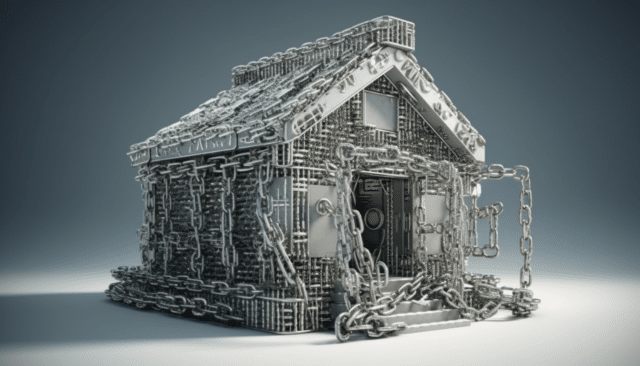Blockchain and proptech are transforming real estate security

Infrastructure is becoming more vulnerable to cyber threats. Therefore, everyone from tech enthusiasts to real estate professionals must pay attention to how blockchain and proptech advancements change the game to keep stakeholders, business owners and tenants safe and sound.
Blockchain is a part of the proptech umbrella, but it encompasses so much -- and blockchain enhances it all.
SEE ALSO: Where do tech workers go after layoffs?
These are a few of the most prominent players in the sector:
- Artificial intelligence (AI) for automation
- Machine learning (ML) for understanding data
- Virtual reality (VR) and augmented reality (AR) for property showings
- Internet of Things (IoT) for data collection
- Big data for understanding the market
- Apps for expanding market visibility, like Zillow
These technologies help streamline the sector for increased customer satisfaction, accessibility and transparency.
And, of course, blockchain is for enhanced cybersecurity of these other high-tech assets. Proptech’s value might soar past $133.05 billion by 2032 because of how business-critical it’s becoming. To stay ahead of the curve, people need to keep in tune with rising tech trends, startups and venture capitalist investments.
How Blockchain Helps Keep Everything Safe
Blockchain is a digital, decentralized ledger that records transactions and digital assets. Everything from rent payments to land purchasing agreements can rest safely in a blockchain. Each transaction is immune to modification because of digital fingerprints called hashes.
Every hash is unique, which makes transactions easy to track and verify through the blockchain. Every hash knows the owner, and every block in the chain can cross-reference its accuracy. Blockchain is essential for the future of real estate because it:
- Enhances transparency
- Increases accountability
- Reduces document tracing
- Expedites property valuation
- Encourages peer-to-peer interactivity
How does blockchain deliver on these promises? Everything goes back to efficiency. Blockchain makes contracts and maintenance requests more transparent and effective. Compare it to traditional methods like paper contracts, which are easily damaged or forged.
Smart contracts are a feature exclusive to the blockchain. They are programs attached to transactions that execute automatically only when specific criteria are met. It provides property owners with digital certificates of authenticity and explicit terms and conditions specific to that contract. Anyone needing information on that sale will know there is only one immutable copy of that data.
The Future of Real Estate With Safer Tools
Being a real estate agent is one of the most sought-after positions, according to what people are searching to see what they need to make it. What will set experts apart from hobbyists are digital transformations and agencies that maximize proptech with blockchain.
Blockchain will change the industry forever for several reasons. Blockchain’s strict verification processes will reduce fraud exponentially. Title transfers can be messy, and blockchain makes transferring and establishing property ownership safer for all parties. Anyone purchasing property will know its history in plain text -- no redactions are possible when everything is tokenized and unforgettable.
It will entice tech-savvy investors, especially regarding trends like real estate crowdfunding and fractional ownership. Making a partial investment in a property will be simpler when there’s safety in numbers and authenticity in the blockchain. Property valuations are there. Proof of work for renovations is there. Shareholders can validate the legitimacy of the maintenance history and the reputations of previous investors. It’s like an internet history that people can’t delete.
Are There Obstacles?
Blockchain and proptech are powerful forces that will, for the most part, change the industry for the better. However, if sector experts can find a way to jump over these main hurdles, it will be even more valuable.
Cyberattacks are hitting infrastructure and the real estate industry more than most. Commercial and governmental property owners should pay particular attention, as critical infrastructure like utilities is particularly vulnerable. Blockchain has higher cybersecurity than other measures, but it isn’t perfect. Different strategies will have to increase defenses to be more comprehensive.
Additionally, blockchain is not known for its sustainability. It uses a lot of energy to validate transactions. Decarbonizing blockchain is still a far-off vision, especially when renewable energy isn’t as commonplace as it could be to handle the energy volume blockchain requires.
Ultimately, any sector -- not just real estate -- can’t get the most from blockchain until it is regulated. Issues like low customer buy-in or interoperability from a lack of program standardization will cause inconsistencies with how real estate agents implement the tech. Therefore, professionals should lobby for more tangible action for blockchain regulation so more sectors can use it productively.
The Dynamic Duo of Proptech and Blockchain
Proptech needs blockchain to level up. Real estate will only become more tech-reliant and popular as a business and for consumers as the market attempts to recover from the latest housing crisis.
There will be less data tampering and more secure transactions if blockchain remains in real estate’s back pocket. Until new proptech develops inspired by blockchain, it will be the go-to for professionals for the foreseeable future.
Image Credit: Wayne Williams

Devin Partida writes about AI, apps and technology at ReHack.com, where she is Editor-in-Chief.
